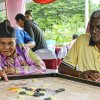.jpg)
Malaysians are living longer than ever but the increased life expectancy comes with challenges of its own.
When Malaysia gained its independence in 1957, the average life expectancy for a Malaysian was just 56 years. Today, however Malaysia’s life expectancy is now about 75 years old, an increase of nearly 20 years which raises the question of whether there is sufficient supply of care for the aged.
By 2020, the population of Malaysians aged 60 and above is expected to hit 4.46 million up from the current 2.32 million. In states such as Selangor, Johor and Perak, the percentage of people aged 60 and above is also expected to increase to 16, 12 and 11 percent respectively by 2020.
The burgeoning number of senior citizens is expected to create a whole new market for elderly health-care and lifestyle services and facilities such as retirement homes, villages and mobile homecare, especially for those who may not have relatives around to look after them.
For example, my brother’s children are now all living overseas and potentially may never return, a fairly common scenario faced by many middle-income Malaysians. And even if you have children who are in the country, they could be too busy with their careers and families or live too far away to be able to take care of you around the clock. Or you may just prefer to live on your own.
My late mother for example, preferred to stay in her own home in Melaka even though we had wanted her to live with her children in Kuala Lumpur after the passing on of my father, as she was too used to living in her house for the last 60 years. As she was diabetic, we engaged a mobile healthcare provider to check on her twice a week in Melaka.
There is a business opportunity here, because many senior citizens today are actually financially well-off due to the boon from real estate assets and other investments but lack access to services and facilities that can enable them to live independently. There is money to be made and people are willing to pay for the right quality services and facilities.
In other countries which have hit the aging issue earlier, innovative new businesses have been created to support the elderly, many of whom prefer to live in their own home over an old-folks home or even in the homes of relatives.
I know of one lady in Singapore who established a subscription based virtual retirement village. Members who pay between RM1,200-3,600 in annual subscription are given access to a directory of concierge services providers such as plumbing, transportation, fitness, travel and others. The service providers are vetted to ensure that they are genuine and can safely be used by the elderly without worries of being taken advantage of. The portal now has a few hundred subscribers.
As part of the Economic Transformation Programme’s (ETP) Healthcare National Key Economic Area (NKEA), we are working on new legislation that will foster the aged care industry by introducing high quality standards to ensure that aged care services can be used with peace of mind.
For example, the new Aged Healthcare Act will serve as a guideline for the provision of services and facilities for the aged care industry. One of the Healthcare Entry Point Projects (EPP) is Mobile Healthcare Services. The Love On Wheels Healthcare Services was the first company announced in the EPP and it helps the elderly recover from ailments in the comfort of their own homes via a range of mobile nursing and rehabilitation services.
We are also working with the insurance industry to regulate the mobile healthcare industry so that home care costs can be borne by insurance. This will make the mobile-healthcare industry more attractive to both the elderly who have insurance and to businesses.
The Aged Healthcare Act, which is expected to be passed at the end of this year, will also transform aged care institutions such as elderly and nursing homes and upgrade skills requirements for care-givers.
We will also support the development of communities for seniors, such as retirement villages, based on the concept of active aging. Such concepts could help stimulate fresh demand in the property sector. We are also working with developers on issues such as how to provide services required by our growing community of seniors.
Source:The Borneo Post
Preparing For Malaysia’s Senior Citizen Boom

